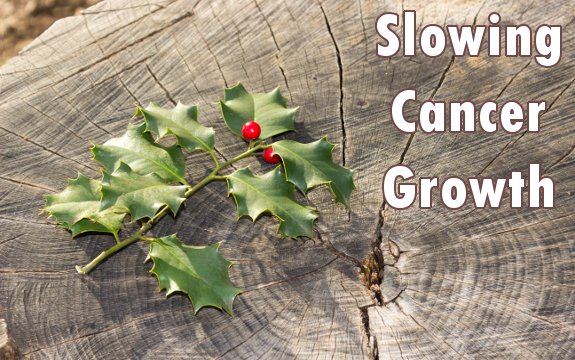Mistletoe can Slow Cancerous Cell Growth without Side Effects

 Research has found that mistletoe, the same plant we stand underneath to get a kiss from someone we adore, can fight cancer – slowing and halting growth of cancer tumors. According to numerous peer-reviewed medical publications, this natural immune booster has killed cancer cells in lab experiments repeatedly. It has effectively treated colon cancer using the Fraxini species that often grows on Ash trees, as well as breast and other common cancers found throughout the world.
Research has found that mistletoe, the same plant we stand underneath to get a kiss from someone we adore, can fight cancer – slowing and halting growth of cancer tumors. According to numerous peer-reviewed medical publications, this natural immune booster has killed cancer cells in lab experiments repeatedly. It has effectively treated colon cancer using the Fraxini species that often grows on Ash trees, as well as breast and other common cancers found throughout the world.
“The extracted mistletoes are composed of many biologically active substances. The principle of the mistletoe phytotherapeutics can be considered as combined cytotoxic and biological response modifying activities that result from the activities of the plant lectins and other biologically relevant substances (Zarkovic et al, 2001)”
This particular type of mistletoe, Fraxini, was found to be more effective than chemotherapy at treating cancerous cells in the colon, but other varieties have been known to treat a host of cancers:
Read: 4 Cancer Fighting Foods
“Cancer sites included breast, lung, stomach, colon, rectum, head and neck, kidney, bladder, melanoma, glioma, and genital. Among these studies, statistically significant positive outcomes were reported for survival (n=8), tumor remission (n=1), overall quality of life (n=3), and quality of life in relation to side effects during cytoreductive therapy (n=3) (Kienle et al, 2003).”
The tradition of hanging mistletoe, a shrub with small red berries, might turn out to be worth saving. Although the mistletoe that many of us hang is Phoradendron flavescens, the North American version, multiple varieties of mistletoe, including Viscum album, may live up to the mystical powers that the Greeks once assigned to the plant. This aphrodisiac was once considered to bestow life and protect an individual against poisons, but now we know about mistletoe’s ability to slow and halt cancer cell growth.
“Our laboratory studies have shown Fraxini mistletoe extract by itself to be highly effective at reducing the viability of colon cancer cells. At certain concentrations, Fraxini also increased the potency of chemotherapy against the cancer cells.
“Of the three extracts tested, and compared with chemotherapy, Fraxini was the only one that showed a reduced impact on healthy intestinal cells. This might mean that Fraxini is a potential candidate for increased toxicity against cancer, while also reducing potential side effects. However, more laboratory testing is needed to further validate this work,” Health Sciences student Zahra Lotfollahi says.
Read: Sea Cucumber Found to Kill 95% of Cancer Cells
This simple plant, with so much symbolism, just might help you or someone you love kiss their cancers goodbye.

Since a rifle or shotgun is needed to harvest tree top high, parasitic mistletoe the alternative meds bill would be even higher! For a representative pic it must have been no effort to pick a holly bushes branch with red berries. Sounds promising like a proper alkaline Ph level.
hummm this is the second time that have the same article about this plant. I know they use it in Germany to treat Cancer, still I don’t think is the same plant we know here or the make the extract removing the toxicity. It will be nice to know more about it before people start getting poisoned and die.
Iscador is one of the makes/brands you can buy. Mistletoe therapy can be given in a variety of ways:
injection under the skin (subcutaneous)
infusion through a drip (intravenous)
injection into the tumour (intratumour)
orally (by mouth). The berries from the tree are toxic however
Mistletoe has small white berries and small round or oval leaves about the size of a dime, found as a parasite in tops of oak trees. The picture shown looks to be holly with its waxy, shiny, thorny leaves and red berries.
Research, clinical observations and patient reports indicate that mistletoe therapy has a range of potential benefits.
These include:
Improved quality of life
generally feeling better
increased appetite and weight
less tired/more energy
reduced pain
better sleep pattern
felling more hopeful and motivated
reduced adverse effects from chemo and radiotherapy
reduced risk of cancer spread and recurrence
increased life expectancy.
What does mistletoe therapy do?
Mistletoe extracts have been shown in studies to:
stimulate the immune system
cause cancer cell death
protect healthy cells against harmful effects of radiation and chemotherapy.